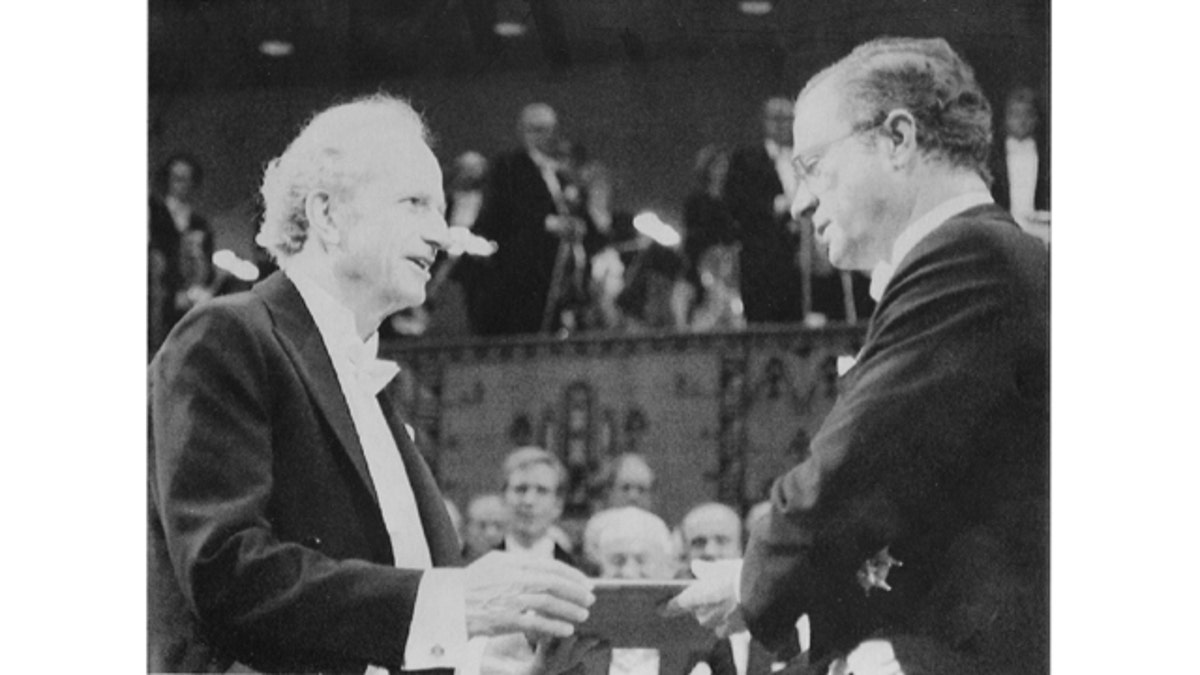
File-This Dec. 10 1992, file photo shows Gary S. Becker, left, from the University of Chicago, receiving the 1992 Nobel Economics Prize from Sweden's King Carl Gustaf, during the Nobel awarding ceremony in the Concert Hall in Stockholm. Becker died Saturday, May 3, 2014, at Northwestern Hospital from complications after an extended illness. He was 83. (AP Photo/Tobbe Gustavsson,File)
Gary Becker, an influential economist who pioneered the use of economics in fields as diverse as crime, marriage, and education, died Saturday at the age of 83 following complications from a surgery.
Using economics to uncover lessons about everyday life is now common. But before Becker, economists limited their research almost exclusively to matters of finance and money.
Becker won a Nobel prize in 1992 for having “extended the domain” of economics, and is remembered by many.
“If there’s one central figure in the revolution that broke apart the fetters around economics, it was Gary,” said Edward Glaeser, a professor of economics at Harvard who learned economics from Becker.
Becker’s thinking revolutionized many areas. One was crime.
“In the 1950s and 1960s intellectual discussions of crime were dominated by the opinion that criminal behavior was caused by mental illness and social oppression, and that criminals were helpless ‘victims,’” Gary Becker said in his Nobel Prize acceptance speech in 1992.
“Such attitudes began to exert a major influence on social policy, [reduced] the apprehension and conviction of criminals, and provided less protection to the law-abiding population.”
Becker argued, that, contrary to prevailing wisdom, criminals are often more rational than people give them credit for.
“Some individuals become criminals because of the financial rewards from crime compared to legal work,” Becker argued, concluding that because of that, harsher penalties and greater enforcement would decrease crime.
Over the following two decades, arrest rates and punishments generally increased and crime fell dramatically, although whether they caused the drop is still debated.
Gary Becker worked closely with Milton Friedman and was also colleagues with his son, David Friedman. Friedman defended Becker’s ideas.
“A lot of liberal ideology, which sees itself as pro-poor, is patronizing-- kind of saying ‘people commit crimes because they’re too stupid.’ Whereas the economic approach is to say ‘we assume everybody equally rational. That I wouldn’t want to be a criminal, but I have a different set of opportunities,’” Friedman told FoxNews.com.
Crime was just one of many things Becker influenced. For example, Becker investigated why extremely popular restaurants that have long lines don’t take advantage of that by simply expanding or raise prices.
The reason, Becker concluded, is that many people like going to places simply because other people also like to do so. As long as the restaurant has long lines, people can be sure they are going to a popular place. If the place expands and the lines go away, the restaurant may soon find itself with less cache and lose business.
“Economists have paid insufficient attention to direct social influences on behavior,” Becker determined in a paper on the subject.
Some of Becker’s contributions may seem obvious today, but were controversial when he introduced them in the 1960s. One was the idea of looking education as an economic investment – as “human capital”, as Becker called it.
“Human capital is so uncontroversial nowadays that it may be difficult to appreciate the hostility in the 1950s and 1960s… The very concept of human capital was alleged to be demeaning because it treated people as machines. To approach schooling as an investment rather than a cultural experience was considered unfeeling and extremely narrow,” Becker said in his Nobel speech.
Other aspects of Becker’s research are still controversial. Recently, he argued that allowing a free market in organs – in other words, allowing people to be paid for donating a kidney – would save lives.
He was particularly passionate about that issue, colleague Sam Peltzman, Professor Emeritus of Economics at the University of Chicago and a colleague of Becker’s for decades, told FoxNews.com.
“He pushed that idea that markets can solve problems – even against a deep revulsion to using markets for that sort of thing. Public opinion never stopped him. He was a rigorous thinker. If there was any way in which he influenced me it probably was in that,” Peltzman said.
Peltzman added that Becker’s demeanor changed over the years.
“I knew him way back when, and he was much younger and much less able to suffer fools – he mellowed as he got older,” Peltzman said.
Becker continued to write and study economics until the end, and kept up writing on his blog up through March 2014.
“He visited UCLA where I had my first job [in the 1960s]… he had the office next to mine and various members of the faculty would come and present their ideas – and he had the arrogance of youth about him, he would tell senior members of our department, “that’s a pretty good idea, but why don’t you work on it some more and come back tomorrow.”
His ideas influenced many.
“What part of my intellectual life is not in some way indebted to Gary Becker?” Edward Glaeser, the Harvard economist, asked rhetorically.
“Becker had a moral force… the way he lived clearly showed that scholarship and teaching were more important to him than anything else. He was a phenomenal economist, and was an enormously kind and wonderful advisor, mentor, and friend,” Glaeser said.
The author of this piece can be reached at maxim.lott@foxnews.com or on Twitter @maximlott

